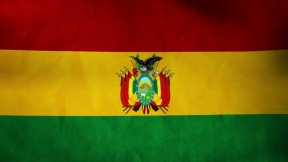By Daniel Nardini
 While there is great attention being focused on Venezuela and its socialist dictator Nicolas Maduro, it seems that the U.S. press, the U.S. government and the rest of South America is forgetting what is happening in a fellow country allied to Maduro: Bolivia. In 2016, the majority of Bolivians voted against a constitutional resolution that would allow current president Morales from running for a fourth term. Theoretically, this should mean that Morales cannot run for a fourth term and that this year Morales should step down. Well, guess what? The Bolivian Supreme Electoral Tribunal, which oversees the voting process in Bolivia, has ruled that Morales can run for a fourth term. This is because all of the people who sit on the Tribunal were chosen by Morales himself. So now nothing stands in his way of becoming president again. Knowing what has been seen in Bolivia’s recent history, Morales will most certainly be “elected” president for a fourth term. You can be sure that the election in Bolivia will not be any more fair than it was in Venezuela.
While there is great attention being focused on Venezuela and its socialist dictator Nicolas Maduro, it seems that the U.S. press, the U.S. government and the rest of South America is forgetting what is happening in a fellow country allied to Maduro: Bolivia. In 2016, the majority of Bolivians voted against a constitutional resolution that would allow current president Morales from running for a fourth term. Theoretically, this should mean that Morales cannot run for a fourth term and that this year Morales should step down. Well, guess what? The Bolivian Supreme Electoral Tribunal, which oversees the voting process in Bolivia, has ruled that Morales can run for a fourth term. This is because all of the people who sit on the Tribunal were chosen by Morales himself. So now nothing stands in his way of becoming president again. Knowing what has been seen in Bolivia’s recent history, Morales will most certainly be “elected” president for a fourth term. You can be sure that the election in Bolivia will not be any more fair than it was in Venezuela.
But none of this comes as a horrible shock for those who are following the long career and dictatorship of Evo Morales. In 2017, Morales had a museum built basically to himself and his cult of personality in the country. Called the Museum of the Democratic and Cultural Revolution, it has portraits, busts and exhibits dedicated to Morales and his relationship to his people and to world leaders. This museum is the more benign aspect of Morales’ rule. Since he became president, Morales has passed laws that have crushed political opposition to his rule. In 2013 he enacted a law that could strip a non-government organization of its right to exist if it “violates its own established bylaws.” And who determines what those violations may be? Of course, Morales! Interestingly enough, the Morales government has accused a number of non-government organizations of “working in collaboration with outside imperialist powers” to overthrow the Bolivian government—just like Maduro is doing now in Venezuela. As if this is not bad enough, Morales has instituted legislation that sharply curtails the freedom of the press, and even allows employers to employ children as young as ten years old! This is in complete contravention of all accepted international labor standards.
Even though these things are happening in Bolivia, you will never really hear about them. Why? There are a couple of reasons. First, Evo Morales has been able to keep his presidency at a low profile in regards to the international press. Second, there are way fewer Bolivians living in the United States or outside of Bolivia in South America. By contrast, there are millions of Venezuelans living in the United States and in many parts of South America who have successfully raised awareness of what is happening in Venezuela. This means that the situation in Bolivia has gone largely unreported. Another important factor is that there is no major economic or political crisis happening in Bolivia—at least for now. The country more or less remains stable even if in the grip of a dictatorship. Yet Evo Morales is one of the heads of state who vehemently support Maduro and his dictatorship. The leftist dictatorships of Venezuela, Nicaragua and Cuba are soundly condemned and rightfully so. So why are we leaving out Bolivia?




 Triton College Launches PEPA Academy March 6, 2025
Triton College Launches PEPA Academy March 6, 2025






The Other South American Dictatorship
By Daniel Nardini
But none of this comes as a horrible shock for those who are following the long career and dictatorship of Evo Morales. In 2017, Morales had a museum built basically to himself and his cult of personality in the country. Called the Museum of the Democratic and Cultural Revolution, it has portraits, busts and exhibits dedicated to Morales and his relationship to his people and to world leaders. This museum is the more benign aspect of Morales’ rule. Since he became president, Morales has passed laws that have crushed political opposition to his rule. In 2013 he enacted a law that could strip a non-government organization of its right to exist if it “violates its own established bylaws.” And who determines what those violations may be? Of course, Morales! Interestingly enough, the Morales government has accused a number of non-government organizations of “working in collaboration with outside imperialist powers” to overthrow the Bolivian government—just like Maduro is doing now in Venezuela. As if this is not bad enough, Morales has instituted legislation that sharply curtails the freedom of the press, and even allows employers to employ children as young as ten years old! This is in complete contravention of all accepted international labor standards.
Even though these things are happening in Bolivia, you will never really hear about them. Why? There are a couple of reasons. First, Evo Morales has been able to keep his presidency at a low profile in regards to the international press. Second, there are way fewer Bolivians living in the United States or outside of Bolivia in South America. By contrast, there are millions of Venezuelans living in the United States and in many parts of South America who have successfully raised awareness of what is happening in Venezuela. This means that the situation in Bolivia has gone largely unreported. Another important factor is that there is no major economic or political crisis happening in Bolivia—at least for now. The country more or less remains stable even if in the grip of a dictatorship. Yet Evo Morales is one of the heads of state who vehemently support Maduro and his dictatorship. The leftist dictatorships of Venezuela, Nicaragua and Cuba are soundly condemned and rightfully so. So why are we leaving out Bolivia?